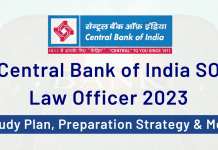Small Industries Development Bank of India, or SIDBI, has been at the forefront of enhancing and developing India’s micro, small, and medium enterprise sector. SIDBI has supported our nation by financing enterprising entrepreneurs to facilitating innovation and sustainability, playing a crucial role in modernizing India’s economic spectrum.

In this blog, we will explore everything you should know about SIDBI, including its mission, the pivotal role it plays in supporting MSMEs, and the range of initiatives it offers to empower businesses. From an aspiring entrepreneur or business owner looking for financial support to simply an interested citizen wanting to know about the impacts of SIDBI on the Indian economy, this guide will provide valuable insights. Let us continue to explore how SIDBI fuels growth, innovation, and opportunity across India!
Overview of SIDBI
Small Industries Development Bank of India (SIDBI) is an important financial institution that catalyzes economic growth in India. SIDBI was incorporated on April 2, 1990, through an Act of Parliament to promote and develop Micro, Small and Medium Enterprises (MSMEs). The full form of SIDBI refers to its precise focus on small industries. Started as an IDBI subsidiary, SIDBI has now emerged to be entirely independent under the Ministry of Finance, Government of India.
Essentially, SIDBI is aimed at providing financial as well as development support to the MSME industries which are critical for India’s industrial and employment growth. SIDBI was instituted to overcome deficiencies in finance and development through loans, refinancing, and other development support services targeted at small businesses. Some of the key services offered by SIDBI include promoting entrepreneurship, modernizing technology, and exports, making it an indispensable player in India’s finance sector.
SIDBI Mission and Vision
Mission: SIDBI’s mission is to enable and promote the flow of credit to the MSME sector in meeting their financial requirements as well as development needs. Its principal objective will be to make the MSME sector more competitive globally, vibrant, and sustainable through various financial products and support services.
Vision: The SIDBI would be an institution that is customer-friendly enough to offer not only financial but also enterprise development by promoting skill building and technology upgradation besides marketing support. As such, the “credit plus” strategy-the famed Sidney Weaver strategy-emerged, where financial aid came combined with additional services contributing to total business expansion .
Importance in the Indian Financial Ecosystem
SIDBI plays a crucial role in the Indian financial ecosystem by:
Support to MSMEs: As the lead financial institution for the MSME sector, SIDBI offers pivotal funding by direct advances and refinancing to banks and other financial institutions. Such support enables small enterprises to expand their operations, modernize technologies, and improve productivity.
Employment Generation: Promoting the MSME sector, SIDBI has a considerable impact on job creation in India. The MSME sector has a long history of establishing employment opportunities in almost all industries.
Promoting Economic Growth: Bank finance for small enterprises contributes to the increase of output and exports which indirectly benefits national economic development. MSMEs are crucial in attaining higher intensities of industrial output and economic diversification.
Sustainable Business Development: SIDBI promotes sustainable business practices by supporting energy efficiency and cleaner production methods among MSMEs.
Key Functions and Services of SIDBI
Small Industries Development Bank of India (SIDBI) has been providing crucial support to the Micro, Small, and Medium Enterprises (MSME) sector through various functions and services. They can be broadly classified into direct lending, indirect lending, microfinance, and other support services.
Direct Lending
SIDBI offers a variety of loan schemes customized to the diverse needs of MSMEs and start-ups:
Term Loans: Available for business expansion and purchase of any equipment. Some notable schemes include:
SIDBI Make in India Soft Loan Fund for MSME (SMILE): Available for new and existing manufacturing and service sector enterprises, starting from an amount of ₹10 lakh up to ₹100 crore; the maximum tenure is up to 10 years.
EXPRESS 2.0: An automated platform for quick term loans for new customers in the manufacturing and service sectors, offering amounts up to ₹1 crore1.
Working Capital Loans: SIDBI provides working capital assistance to help businesses manage their operational costs effectively.
Specialized Schemes: Programs like SAATH for SC/ST entrepreneurs and ARJANA for women entrepreneurs emphasize inclusivity in financial support.
Indirect Lending
SIDBI also facilitates indirect lending through partnerships with banks and financial institutions:
Refinancing: It offers refinance facility to PLIs, comprising banks and state-level financial institutions. In this process, the aim is to improve the resource base of these institutions to support the credit flow to the MSME sector.
Collaboration with International Institutions: SIDBI has collaborated with international institutions like the World Bank and Japan International Cooperation Agency to expand its source of funding and provide concessionary interest rates.
Microfinance and Financial Inclusion
This follows mainly due to the significant contributions that SIDBI plays for financial inclusion:
Microfinance Initiatives: It offers microfinance solutions to small entrepreneurs in mainly rural areas, enabling them to set up or expand their businesses. Such support is essential for economic empowerment in rural entrepreneurial stakeholders who lack access to more conventional banking services.
Other Services
Apart from lending, SIDBI offers diverse supportive services:
Advisory services: SIDBI guides entrepreneurs about decisions regarding business, enabling their efforts to understand the intricate complexities of financing and management operations. The loan process is accompanied by relationship managers to ensure the business gets well-consulted advice.
Skill development programs: Aided through skill development interventions, SIDBI develops skills to enhance the capabilities of MSMEs. It focuses on improving workforce skills aligned with the demands of the industry, thereby fostering a competitive environment within the MSME sector.
SIDBI’s multi-pronged approach to direct lending combined with indirect support through partnership and microfinance initiatives, along with advisory services, makes it a very viable performer in enhancing the growth and sustainability of MSMEs in India.
Schemes and Initiatives by SIDBI
To support and nurture the growth and sustainability of MSMEs in India, a long list of schemes and initiatives have been designed by the Small Industries Development Bank of India, otherwise known as SIDBI. The range of such schemes specifically targets the challenges that small businesses face uniquely to provide them with the necessary financial and resource back-up.
SMILE (SIDBI Make in India Loan for Enterprises) Scheme
With the objective of supporting the government’s Make in India campaign, SMILE provides soft loans to MSMEs to set up new ventures or to expand upon existing ones. The loan amount provided by the scheme for the general MSMEs varies between ₹10 lakh and ₹25 lakh; however, in case of SC/ST, women-led enterprises, the loan amount may reach up to ₹30 lakh. The interest rates are extremely competitive, starting at 9.15% per annum for three-year repayments, and the repayment period can be up to 10 years with a moratorium of up to three years. This scheme not only provides easy access to finance but also promotes entrepreneurship among the vulnerable sections.
SAATH Scheme
Another promising scheme is SAATH, exclusively for MSMEs promoted by SC/ST entrepreneurs. The SAATH scheme is aimed at increasing financial inclusion. This scheme provides loans of ₹25 lakh to ₹300 lakh and offers credit guarantee where the government gives credit guarantee covering 50% of the credit guarantee fee, hence helping such entrepreneurs or businessmen to secure funding from banks. The interest rates are on MCLR of the bank so that the terms are still workable for the borrower. Focusing on SC/ST entrepreneurs, SAATH lays significant stress on the promotion of diversity and inclusiveness in the MSME sector.
TULIP
TULIP is a Top Up Loan For Immediate Purposes. This is meant to help existing SIDBI customers. It is designed as a quick service to meet any business need for working capital/operational expenses. The loan amount is earmarked according to the repute of the borrower’s exposure or the sales performance and the repayment terms individually tailored to the needs of the business and are so offered by SIDBI.
SPEED
Recently, SIDBI initiated the SPEED scheme—the loan for the purchase of equipment for enterprise development. The focus is on financial assistance for equipment purchases by MSMEs to increase productivity through proper machinery and equipment procurement. In this scheme, SIDBI will offer 100% financing of all project costs but subject to project viability, with flexible repayment terms that follow the character of the financed equipment.
Beyond these financial schemes, SIDBI focuses on maintaining financial inclusion through microfinance initiatives. The bank engages with Micro Finance Institutions (MFIs) to offer micro-loans specifically targeting less-privileged populations, including rural entrepreneurs who usually lack access to conventional banking services. Besides contributing to individual entrepreneurship development, the approach aids in economies of scale in terms of developing broader economics in rural areas.
Avaana Sustainability Fund (ASF)
Avaana Sustainability Fund is a new program launched by SIDBI to encourage MSMEs to embrace sustainability. This avenue avails funds to projects that seek to contribute to environmental sustainability and efforts at mitigating climate change. SIDBI anchored this fund with $24.5 million from GCF, which will be used to provide financial support to MSMEs engaging in sustainable practices. The fund shall help investments in green technologies, energy efficiency, and renewable energies by facilitating projects, thus supporting businesses to shift to greener operations while at the same time making it easier for them to compete in the market.
Cluster Development Fund
A SIDBI Cluster Development Fund was established to support further MSME infrastructure development through financial support to state governments. This initiative focuses on particular clusters of MSMEs by imparting them with necessary facilities and tools to make operational capabilities better. In FY 2024, SIDBI disbursed ₹2,252 crore under the fund and covered around 1.72 lakh MSMEs across different states and Union Territories. The key goal of the fund is to develop important infrastructure facilities like common service centers, testing labs, or incubation centers.
Mission Swavalamban
Mission Swavalamban is another program of SIDBI, which aims to promote entrepreneurship among the underrepresented sections of society. Mission Swavalamban provides many deserving individuals, including women and marginalized groups, with appropriate skills and financial support to enable them to generate employment opportunities for themselves. SIDBI conducts training programs, workshops, and awareness campaigns through this initiative in order to spread the message of entrepreneurship and self-employment. Create a facilitative environment for budding entrepreneurs through access to credit and mentorship.
Bihar Startup Scale-up Financing Fund (BSSFF)
SIDBI has collaborated with the Bihar Startup Fund Trust for the management of the Bihar Startup Scale-up Financing Fund, BSSFF, to promote Bihar Startups. With an allocation of ₹50 Crore, such a fund provides financial support for the innovative set-ups with a possibility of high growth. The initiative is supposed to foster the development of a startup ecosystem in Bihar by not only providing funding but also mentoring support and access to networks that would help entrepreneurs scale up their businesses effectively.
Digital Initiatives
To modernize its operations and enhancing service delivery, SIDBI has largely led the way in digitalization. Various digital initiatives were initiated to simplify lending procedures and to enhance availability for the MSME sector. This encompasses online loan application systems, digital documentation processes, and the introduction of mobile applications where entrepreneurs can conveniently manage their loans. These interventions are important for the digitization goal because it reduces the turnaround time for loan approvals while making financial services accessible to micro-enterprises and small businesses.
Career Opportunities at SIDBI: The Road to Success with the SIDBI Grade A/B Exam
SIDBI Grade A and Grade B is one of the most desirable opportunities for an aspirant eyeing a career in the financial sector. SIDBI not only provides a safe and good career but also the opportunity to contribute to the growth and empowerment of the MSME sector, an essential engine of India’s economy.
Working at SIDBI as a Grade A officer opens up great learning and growth avenues. The role provides an opportunity to get exposed to all kinds of financial services and development activities that are being undertaken for the advancement of small industries. The work environment is excellent, job stability good, and work conducive to the meaningful contribution of India’s financial ecosystem. This combination of personal growth and professional fulfillment makes the SIDBI Grade A exam a golden opportunity for aspirants.
If cracking the SIDBI Grade A exam and having a rewarding career is your dream, the answer has come knocking at your door in the form of ixamBee. At ixamBee, we offer end-to-end support to ensure you acing the exam. Our online course for SIDBI Grade A, mock tests, and previous year’s question papers will go a long way in equipping you to face the exam head-on. With in-depth study materials and practice resources, you can face all phases of the exam with confidence, so enhancement in chances of success will surely occur.
Through SIDBI, as a career, a person chooses a future full of opportunities, stability, and meaningful work. ixamBee, being your guide, can help you start the journey toward achieving your goal of getting into this prestigious institution. Let us help you on your way to success with SIDBI!
Conclusion
The Small Industries Development Bank of India (SIDBI) stands as a pillar of support for the growth and development of India’s MSME sector. From its establishment to its far-reaching objectives, SIDBI functions as more than just a financial institution—it is a catalyst for economic progress, entrepreneurship, and sustainability. Whether it’s through its innovative schemes, digital initiatives, or career opportunities like the SIDBI Grade A exam, the bank plays a vital role in shaping India’s financial and industrial landscape.
For aspiring entrepreneurs, small business owners, or individuals seeking a rewarding career in finance, SIDBI provides a world of opportunities. With its focus on empowering small industries and fostering sustainable practices, SIDBI continues to drive change and development across the nation.
At ixamBee, we specialize in providing comprehensive online courses for government exams and online courses for government jobs. Our expertly designed courses for government jobs cater to a wide range of upcoming government exams. Whether you’re preparing for specific courses for government exams or seeking general guidance, ixamBee offers the resources like Beepedia previous year papers, SSC CGL, SSC CHSL, SSC MTS and other mock tests to succeed in exams like RBI Grade B, SEBI Grade A, NABARD Grade A, RRB NTPC, SSC MTS, NIACL Assistant, and more.
Also Read:
List of Top Government Banks in India 2024
Important Personal Interview Questions for SIDBI Grade A 2024
SIDBI Grade A Salary 2024: Assistant Manager Basic Pay, Allowances & Perks














